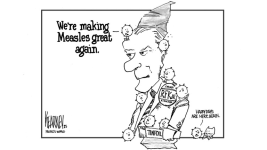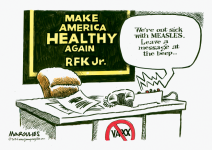signalmankenneth
Verified User
ProPublica —
Leaders at the Centers for Disease Control and Prevention ordered staff this week not to release their experts’ assessment that found the risk of catching measles is high in areas near outbreaks where vaccination rates are lagging, according to internal records reviewed by ProPublica.
In an aborted plan to roll out the news, the agency would have emphasized the importance of vaccinating people against the highly contagious and potentially deadly disease that has spread to 19 states, the records show.
A CDC spokesperson told ProPublica in a written statement that the agency decided against releasing the assessment “because it does not say anything that the public doesn’t already know.” She added that the CDC continues to recommend vaccines as “the best way to protect against measles.”
But what the nation’s top public health agency said next shows a shift in its long-standing messaging about vaccines, a sign that it may be falling in line under Health and Human Services Secretary Robert F. Kennedy Jr., a longtime critic of vaccines:
“The decision to vaccinate is a personal one,” the statement said, echoing a line from a column Kennedy wrote for the Fox News website. “People should consult with their healthcare provider to understand their options to get a vaccine and should be informed about the potential risks and benefits associated with vaccines.”
ProPublica shared the new CDC statement about personal choice and risk with Jennifer Nuzzo, director of the Pandemic Center at Brown University School of Public Health. To her, the shift in messaging, and the squelching of this routine announcement, is alarming.
“I’m a bit stunned by that language,” Nuzzo said. “No vaccine is without risk, but that makes it sound like it’s a very active coin toss of a decision. We’ve already had more cases of measles in 2025 than we had in 2024, and it’s spread to multiple states. It is not a coin toss at this point.”
For many years, the CDC hasn’t minced words on vaccines. It promoted them with confidence. One campaign was called “Get My Flu Shot.” The agency’s website told medical providers they play a critical role in helping parents choose vaccines for their children: “Instead of saying ‘What do you want to do about shots?,’ say ‘Your child needs three shots today.’”
Nuzzo wishes the CDC’s forecasters would put out more details of their data and evidence on the spread of measles, not less. “The growing scale and severity of this measles outbreak and the urgent need for more data to guide the response underscores why we need a fully staffed and functional CDC and more resources for state and local health departments,” she said.
Kennedy’s agency oversees the CDC and on Thursday announced it was poised to eliminate 2,400 jobs there.
When asked what role, if any, Kennedy played in the decision to not release the risk assessment, HHS’ communications director said the aborted announcement “was part of an ongoing process to improve communication processes — nothing more, nothing less.” The CDC, he reiterated, continues to recommend vaccination “as the best way to protect against measles.”
“Secretary Kennedy believes that the decision to vaccinate is a personal one and that people should consult with their healthcare provider to understand their options to get a vaccine,” Andrew G. Nixon said. “It is important that the American people have radical transparency and be informed to make personal healthcare decisions.”
Responding to questions about criticism of the decision among some CDC staff, Nixon wrote, “Some individuals at the CDC seem more interested in protecting their own status or agenda rather than aligning with this Administration and the true mission of public health.”
The CDC’s risk assessment was carried out by its Center for Forecasting and Outbreak Analytics, which relied, in part, on new disease data from the outbreak in Texas. The CDC created the center to address a major shortcoming laid bare during the COVID-19 pandemic. It functions like a National Weather Service for infectious diseases, harnessing data and expertise to predict the course of outbreaks like a meteorologist warns of storms.
Other risk assessments by the center have been posted by the CDC even though their conclusions might seem obvious.
In late February, for example, forecasters analyzing the spread of H5N1 bird flu said people who come “in contact with potentially infected animals or contaminated surfaces or fluids” faced a moderate to high risk of contracting the disease. The risk to the general U.S. population, they said, was low.
https://www.cnn.com/2025/03/31/health/cdc-measles-forecast-propublica/index.html


Leaders at the Centers for Disease Control and Prevention ordered staff this week not to release their experts’ assessment that found the risk of catching measles is high in areas near outbreaks where vaccination rates are lagging, according to internal records reviewed by ProPublica.
In an aborted plan to roll out the news, the agency would have emphasized the importance of vaccinating people against the highly contagious and potentially deadly disease that has spread to 19 states, the records show.
A CDC spokesperson told ProPublica in a written statement that the agency decided against releasing the assessment “because it does not say anything that the public doesn’t already know.” She added that the CDC continues to recommend vaccines as “the best way to protect against measles.”
But what the nation’s top public health agency said next shows a shift in its long-standing messaging about vaccines, a sign that it may be falling in line under Health and Human Services Secretary Robert F. Kennedy Jr., a longtime critic of vaccines:
“The decision to vaccinate is a personal one,” the statement said, echoing a line from a column Kennedy wrote for the Fox News website. “People should consult with their healthcare provider to understand their options to get a vaccine and should be informed about the potential risks and benefits associated with vaccines.”
ProPublica shared the new CDC statement about personal choice and risk with Jennifer Nuzzo, director of the Pandemic Center at Brown University School of Public Health. To her, the shift in messaging, and the squelching of this routine announcement, is alarming.
“I’m a bit stunned by that language,” Nuzzo said. “No vaccine is without risk, but that makes it sound like it’s a very active coin toss of a decision. We’ve already had more cases of measles in 2025 than we had in 2024, and it’s spread to multiple states. It is not a coin toss at this point.”
For many years, the CDC hasn’t minced words on vaccines. It promoted them with confidence. One campaign was called “Get My Flu Shot.” The agency’s website told medical providers they play a critical role in helping parents choose vaccines for their children: “Instead of saying ‘What do you want to do about shots?,’ say ‘Your child needs three shots today.’”
Nuzzo wishes the CDC’s forecasters would put out more details of their data and evidence on the spread of measles, not less. “The growing scale and severity of this measles outbreak and the urgent need for more data to guide the response underscores why we need a fully staffed and functional CDC and more resources for state and local health departments,” she said.
Kennedy’s agency oversees the CDC and on Thursday announced it was poised to eliminate 2,400 jobs there.
When asked what role, if any, Kennedy played in the decision to not release the risk assessment, HHS’ communications director said the aborted announcement “was part of an ongoing process to improve communication processes — nothing more, nothing less.” The CDC, he reiterated, continues to recommend vaccination “as the best way to protect against measles.”
“Secretary Kennedy believes that the decision to vaccinate is a personal one and that people should consult with their healthcare provider to understand their options to get a vaccine,” Andrew G. Nixon said. “It is important that the American people have radical transparency and be informed to make personal healthcare decisions.”
Responding to questions about criticism of the decision among some CDC staff, Nixon wrote, “Some individuals at the CDC seem more interested in protecting their own status or agenda rather than aligning with this Administration and the true mission of public health.”
The CDC’s risk assessment was carried out by its Center for Forecasting and Outbreak Analytics, which relied, in part, on new disease data from the outbreak in Texas. The CDC created the center to address a major shortcoming laid bare during the COVID-19 pandemic. It functions like a National Weather Service for infectious diseases, harnessing data and expertise to predict the course of outbreaks like a meteorologist warns of storms.
Other risk assessments by the center have been posted by the CDC even though their conclusions might seem obvious.
In late February, for example, forecasters analyzing the spread of H5N1 bird flu said people who come “in contact with potentially infected animals or contaminated surfaces or fluids” faced a moderate to high risk of contracting the disease. The risk to the general U.S. population, they said, was low.
https://www.cnn.com/2025/03/31/health/cdc-measles-forecast-propublica/index.html


